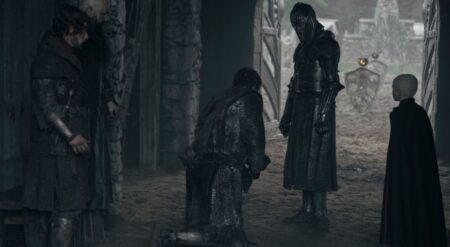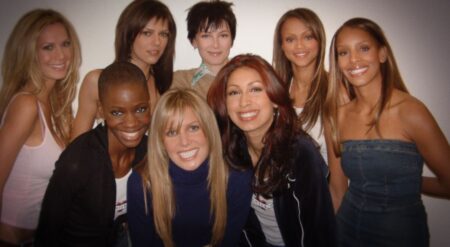If Prime Video’s year of streaming releases is any indication (as is HBO’s The Pitt), the people yearn for procedural dramas. Ballard, a spin-off series of the Prime Video original Bosch, is another police procedural series from the streamer. With On Call, Cross, and Countdown rounding out the most recent titles, it’s clear that detective series are making a sharp comeback.
Created by Michael Alaimo and Kendall Sherwood, Ballard continues to bring Michael Connelly’s bestselling novels to life, following Detective Renée Ballard (Maggie Q) as she leads the LAPD’s new and underfunded cold case division, tackling the city’s most challenging long-forgotten crimes with empathy and relentless determination.
As she peels back layers of crimes spanning decades, including a serial killer’s string of murders and a murdered John Doe, she soon uncovers a dangerous conspiracy within the LAPD. With the help of her volunteer team and retired detective Harry Bosch (Titus Welliver), Detective Ballard navigates personal trauma, professional challenges, and life-threatening dangers to expose the truth.
Prime Video’s Ballard is capturing the moment where people want crime dramas more than ever.

Maggie Q has a long action filmogrpahy, and its what has given her a gravitas when on screen. This is what grounds her in Ballard as the titular lead and her ability to show long-standing grudges, deep empathy, and the dedication to justice work well to make her character endearing. I don’t watch much copaganda now, given well, the state of the world. Still, Detective Ballard’s intensity and focus on the victim help keep this series from going too far astray.
Renée Ballard is sharp, logical, and not to be crossed. Her tenacity is one of her defining characteristics, and as she moves from one man looking to strongarm her or stonewall her case as she advances forward with it, it is endearing. She’s fighting, and that’s one thing that stands out, even as she processes family grief and her trauma at the same time.
I mean, the woman beats down an intruder in her home, calls her partner, and performs a field trach with household supplies while coached on the phone. Yes, the man who almost killed her to make sure that the case doesn’t go up in smoke. It’s a moment that works extremely well to show her resourcefulness and her dedication to the case.
Maggie Q makes for a fantastic lead character.

Even with that, Maggie Q‘s performance in the wake of the attack is what makes Renée Ballard even more complex. She has to be strong and resolute, but at the same time, she’s traumatized. As she’s brought into the hospital with pictures being taken of her body and bruises, she looks vulnerable. She seems small and frail in a way that she hasn’t all season.
The series’ complexity rests on Q’s performance and how she oscillates between powerful and fragile, tenacious and beaten down. As Renée, Q is asked to be both intimidating and small, and she strikes that balance well. Ultimately, she is a smaller woman, and the danger she faces grows and is balanced against it.
When Renée interacts with Bosch, a smart inclusion for the series given the character’s success on the platform, she doesn’t stand in his shadow. They respect each other, and even when she’s at her lowest, he doesn’t treat her like she’s failed. Instead, he trusts her enough to follow through on what she needs and to help close the case, especially as it becomes increasingly noticeable that the bad guy is in the LAPD to begin with.
Ballard’s success also comes from its narrative format. The Prime Video series embraces a case-of-the-week skeleton but wraps it all in a larger serial killer case that exposes significant gaps in the LAPD. There is corruption, and that seems to be at the heart of modern police dramas in 2025 (although it’s really a thinly veiled, not all cops rhetoric driver, but I digress).
Dirty cops take the spotlight, just like every other Prime Video crime drama.

Holding the cops accountable is Ballard’s largest puzzle to pull together. Who is dirty, who is sharing secrets, and who is endangering everyone, trying to solve the murder cases the crew keeps finding themselves in? Every one of the crew becomes central to keeping Renee held together, and the case alive, even while the LAPD closes ranks.
The extended cast works to highlight the need for transparency across each of the characters: Thomas Laffont (John Carroll Lynch), Samira Parker (Courtney Taylor), Ted Rowls (Michael Mosley), Martina Castro (Victoria Moroles), and Colleen Hatteras (Rebecca Field). While Laffont is Ballard’s partner, Parker is the grounding force of the series. She’s the voice of the victims and the one known on the force to expose police malfeasance.
This puts a large weight on Parker’s shoulders. She’s the daughter of a cop, but she’s also a Black woman dealing with the reality of what the cops do to Black people as they try to solve a crime where undocumented immigrants are being targeted. She is the voice for people who are falling into the cracks and purposefully being erased.
Still, the series doesn’t do much to alleviate the fears of immigrant violence. If anything, the series continues to perpetuate the narrative, where it uses good cops to dispel the idea of bad cops and balance the scales. However, every “good” immigrant story is met with another bad one, with the shadow of the cartel looming.
John Carroll Lynch and Courtney Taylor are central to holding Ballard’s focus when Q isn’t on screen.

The only reason I feel that this needs to be mentioned, particularly given the long history of cop dramas, is that Ballard finds itself on uneven footing in how it confronts the undocumented. In one moment, Maggie’s Q’s detective will correct “illegal” to “undocumented.”
But in another, she will lambast people about the cartel. It’s Black women who carry the burden of showing empathy to immigrants, and that alone seems to be the role they find themselves in for these Prime Video series (it was the same in June 2025’s Countdown).
While some of the larger elements of the series are just par for the course of police dramas and procedurals, Ballard manages to do well despite them. This is due in large part to Maggie Q, Courtney Taylor, and John Caroll Lynch’s performances. The two women anchor the series, and Lynch’s Laffont adds levity and introspection as well. The trio is what makes it work, even when it starts to buckle.
Ballard pulls off the one case holding every episodic beat in place.

It’s in Ballard’s last episodes that everything comes together, which makes its rocky middle well worth it. In the previous episodes, the serial killer comes into focus. The dots begin to connect between each victim. Each one was a woman, someone happy, someone succeeding. The series expertly delivers a payoff for the wider mystery that keeps surprising, even when the answer is explored.
The core of the cold cases is that they are all linked by the same misogynistic killer. As Renée Ballard is undermined by others in homicide, and thought to be less than, because volunteers run the cold case unit, she proves herself over and over. By having a powerful woman take down a killer who hates powerful women, Q’s Renée pulls off cathartic poetic justice. Yes, it’s scripted, and it works exceptionally well.
This doesn’t mean that Renée doesn’t hurt people or make mistakes; she does. Still, its justice that she’s focused on, not being liked. It’s what drives her when all else fails and its what helps her confront the big bad at the end of the serial killings.
All in all, Ballard is Prime Video capitalizing on a resurgence of police dramas, but that isn’t a bad thing. Sure, it’s off-base at times, but the drama, the characters, and the intrigue keep the series trucking along. If you’ve enjoyed any of the Prime Video Original series in the same vein, then this is one to drop into your watchlist.
Ballard is streaming now exclusively on Prime Video.
Ballard Season 1
-
Rating - 8/108/10
TL;DR
Ballard is Prime Video capitalizing on a resurgence of police dramas, but that isn’t a bad thing. Sure, it’s off-base at times, but the drama, the characters, and the intrigue keep the series trucking along.







